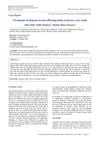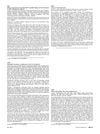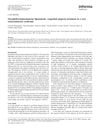 March 2022 in “International journal of biology, pharmacy and allied sciences”
March 2022 in “International journal of biology, pharmacy and allied sciences” Ayurvedic treatment with local herbal applications successfully regrew hair in a patient with alopecia areata.
 November 2021 in “International Journal for Research in Applied Science and Engineering Technology”
November 2021 in “International Journal for Research in Applied Science and Engineering Technology” Lyophilized platelet-rich plasma is beneficial and effective for various medical treatments, including tissue regeneration and hair regrowth.
 February 2021 in “International journal of research in dermatology”
February 2021 in “International journal of research in dermatology” A boy's hair, nails, and skin improved after 6 months of steroid treatment.
 January 2020 in “Der Pharmacia Lettre”
January 2020 in “Der Pharmacia Lettre” Nanoparticle-based herbal remedies could be promising for treating hair loss with fewer side effects and lower cost, but more research is needed.
 February 2019 in “International journal of scientific reports”
February 2019 in “International journal of scientific reports” Unani medicine helped regrow eyebrow hair in 45 days.
 December 2018 in “Meandros medical and dental journal”
December 2018 in “Meandros medical and dental journal” A man developed a rare late-onset hair-pulling disorder, usually seen in younger people.
 August 2018 in “Journal of the American Academy of Dermatology”
August 2018 in “Journal of the American Academy of Dermatology” Calcipotriol may effectively treat hair loss in alopecia areata, working better in children than adults.
 May 2017 in “InTech eBooks”
May 2017 in “InTech eBooks” Trichoscopy and trichogram are useful for diagnosing hair and scalp conditions.
 March 2017 in “De Gruyter eBooks”
March 2017 in “De Gruyter eBooks” The Leechbook shows how hair and sexual health were key to medieval masculinity and some remedies may still be useful.
 May 2015 in “Journal of The American Academy of Dermatology”
May 2015 in “Journal of The American Academy of Dermatology” Oral minoxidil effectively increases hair growth in male baldness but can cause side effects like excessive hair growth and swelling.
 November 2013 in “Elsevier eBooks”
November 2013 in “Elsevier eBooks” Skin and hair renewal is maintained by both fast and slow cycling stem cells, with hair regrowth primarily driven by specific stem cells in the hair follicle bulge. These cells can also help heal wounds and potentially treat hair loss.
 April 2012 in “Informa Healthcare eBooks”
April 2012 in “Informa Healthcare eBooks” Alopecia areata is a common autoimmune condition causing varying hair loss, diagnosed by specific patterns of inflammation around hair follicles, with several treatment options available.

PEGylated liposomal doxorubicin improves cancer treatment effectiveness and reduces side effects like heart damage and hair loss.
 July 2002 in “Australasian Journal of Dermatology”
July 2002 in “Australasian Journal of Dermatology” A woman with lupus had hair loss and skin issues that were successfully treated with medications.
 May 2002 in “Australasian Journal of Dermatology”
May 2002 in “Australasian Journal of Dermatology” Finasteride is effective for male hair loss, teledermatology is accurate and accepted, and cyclosporin helps treat toxic epidermal necrolysis.
 January 1953 in “The Lancet”
January 1953 in “The Lancet” Cortisone may help hair regrow by altering the local environment, with regrowth starting 3-4 weeks after treatment, but its use is not widely recommended.
March 2023 in “Journal of Cosmetic Dermatology” Hair transplantation significantly improves quality of life and self-esteem in men with hair loss.
 January 2022 in “Journal of Healthcare Sciences”
January 2022 in “Journal of Healthcare Sciences” Male Androgenetic Alopecia, a common hair loss in men, can be slowed and partially restored with treatments like minoxidil and finasteride, or hair transplantation. Serenoa repens may be an alternative treatment. More research is needed for new treatments.
 91 citations,
November 2007 in “Archives of Dermatology”
91 citations,
November 2007 in “Archives of Dermatology” Smoking linked to hair loss in Asian men.
 63 citations,
March 1995 in “International Journal of Dermatology”
63 citations,
March 1995 in “International Journal of Dermatology” Some drugs can cause hair loss, and stopping these drugs often leads to hair regrowth.
 38 citations,
November 2013 in “Journal of The American Academy of Dermatology”
38 citations,
November 2013 in “Journal of The American Academy of Dermatology” Higher BMI links to worse hair loss in Taiwanese men.
 35 citations,
January 2002 in “Dermatology”
35 citations,
January 2002 in “Dermatology” A woman's hair loss during treatment with specific hepatitis C drugs grew back after stopping the medication.
 22 citations,
March 2000 in “Clinics in Dermatology”
22 citations,
March 2000 in “Clinics in Dermatology” Many treatments for hair loss lack proper testing and FDA approval, so their effectiveness is uncertain.
 17 citations,
January 1985 in “International Journal of Dermatology”
17 citations,
January 1985 in “International Journal of Dermatology” Minoxidil may help hair growth by stopping immune system attacks on hair follicles.
 16 citations,
September 2018 in “Journal of Ethnopharmacology”
16 citations,
September 2018 in “Journal of Ethnopharmacology” Plant-based remedies may treat hair loss by reducing inflammation and improving insulin resistance.
 9 citations,
March 2017 in “Dermatologic Surgery”
9 citations,
March 2017 in “Dermatologic Surgery” Asian men with hair loss have different follicular densities: East/Southeast 61.1, South 63.5, West 63.6 FU/cm².
 7 citations,
September 2020 in “Journal of Cosmetic Dermatology”
7 citations,
September 2020 in “Journal of Cosmetic Dermatology” Smoking increases early hair loss risk in men; quitting may help prevent it.
 4 citations,
September 2013 in “Journal of Plastic Surgery and Hand Surgery”
4 citations,
September 2013 in “Journal of Plastic Surgery and Hand Surgery” A girl with a rare syndrome had successful hair loss treatment with no relapse after 4 years.
 1 citations,
April 2017 in “Journal of Investigative Dermatology”
1 citations,
April 2017 in “Journal of Investigative Dermatology” Tofacitinib may slow hair loss in scarring alopecias but is unlikely to regrow significant hair.

Mesotherapy is a promising alternative to minoxidil for hair loss with mild side effects.





























